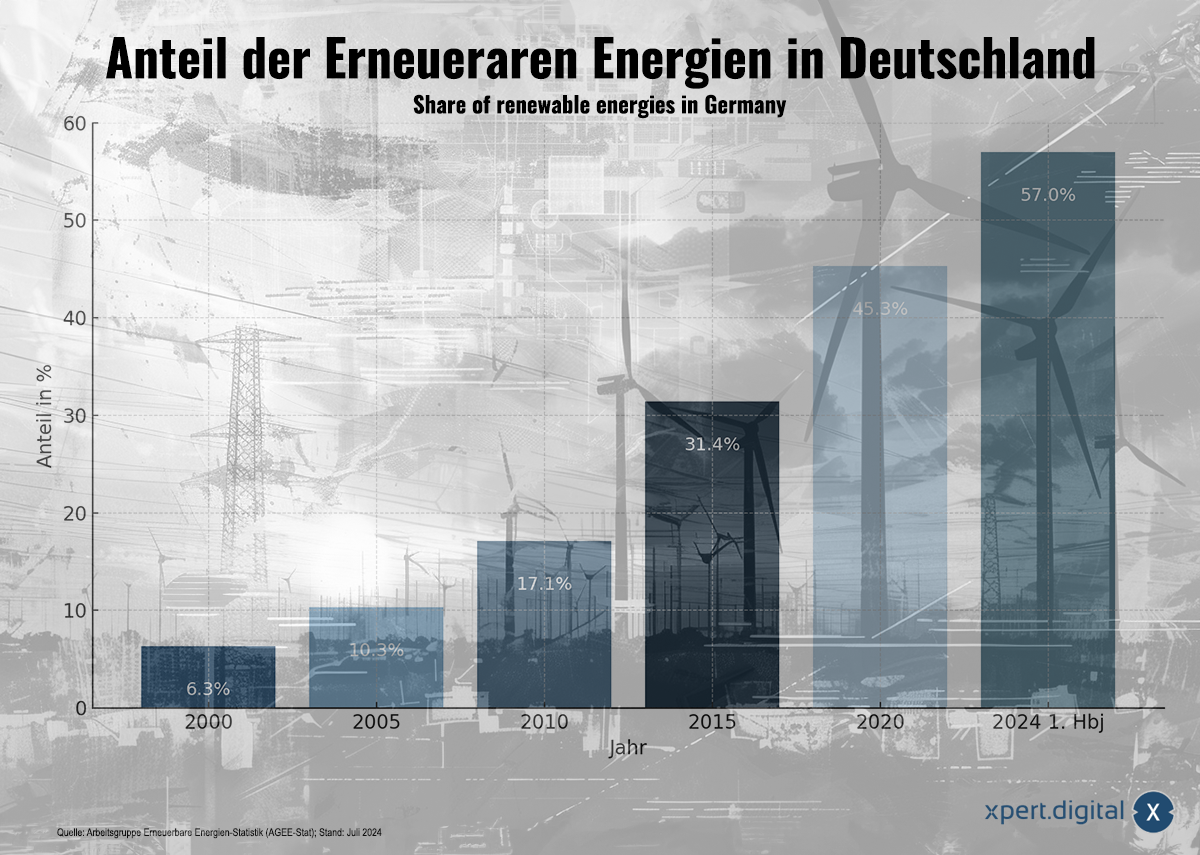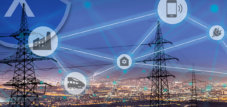
Energy transition with a strategy error: At almost 60%, there would already be enough renewable energy, but not when it is needed - Image: Xpert.Digital
⚡ Energy transition with strategic flaws 🚨
🌞🏗️ Progress and weaknesses in infrastructure and strategy: the German energy transition in focus
Germany is at a critical juncture in its energy transition. Despite impressive progress in expanding renewable energies, the weaknesses in the current strategy and infrastructure are becoming increasingly apparent. In particular, the unequal distribution of energy production and the slow expansion of the grid infrastructure pose immense challenges to the energy transition.
🔋 Back in 2020, the platform Xpert.Digital warned of the increasing importance of energy storage systems to ensure the stability of the German power grid. This warning has proven to be prescient. According to a report in the Frankfurter Rundschau on September 2, 2024, Germany possesses energy reserves equivalent to the output of five nuclear power plants, but these resources are not being used efficiently. Instead, there is a significant discrepancy between production and actual energy demand, underscoring the need for improved storage and distribution technology.
Suitable for:
🌍🌞 A key problem lies in the time-of-day dependency of electricity production. Renewable energies, especially solar and wind power (in many regions it is less windy at night), often produce more electricity during the day than is needed, while in the evening hours, when demand increases, there is not enough energy available. These fluctuations illustrate the current inadequacy of the German energy system to respond adequately to variable energy sources.
🚧 Another significant problem is the sluggish expansion of the electricity grid. The existing infrastructure is unable to efficiently integrate the rapidly growing capacities of renewable energies. Grid bottlenecks and inefficient energy distribution are the result, jeopardizing security of supply. Federal Minister for Economic Affairs Robert Habeck pointed out in July 2023 that thousands of kilometers of additional power lines will be needed over the next two decades to ensure energy security. However, the planning and approval of these projects are proving to be lengthy and complex, which further significantly delays the expansion.
Matches:
- More speed for electricity network expansion: The need for an expanded network - especially for renewable energies
- Infrastructure Electricity Highway: Grid expansion and the energy transition – shaping and expanding a sustainable future
🛠 The challenges of integrating renewable energies are illustrated by concrete examples. As the Frankfurter Rundschau (September 2, 2024) reports , the rapid increase in new installations such as heat pumps and charging stations for electric vehicles in Oranienburg has led to significant grid bottlenecks. The city now has to inform property owners that they cannot register any further installations for the time being. This demonstrates that the electricity grid in many regions of Germany is already reaching its limits.
🛠 Xpert.Digital can report from its own projects in the economy that solar parking lots and rooftop solar systems in industrial complexes cannot be implemented and must be postponed to a later date, as the grid capacities in the affected regions are already fully utilized.
The delay in implementing urgently needed infrastructure projects not only jeopardizes the energy supply, but also the achievement of climate goals.
💰 In addition to the technical and infrastructural challenges, there are also financial hurdles. Expanding grid capacity requires significant investments, which in many cases cannot be provided in time. One example is the construction of large-scale industrial solar power plants, as mentioned above, which cannot be implemented in many regions due to grid capacity constraints. The completion of these projects could be delayed by several years, if not a decade, further hindering the energy transition.
These problems raise fundamental questions about Germany's energy transition strategy. Simply increasing the share of renewable energies is not enough. Rather, the entire energy infrastructure, from storage systems and electricity grids to distribution and energy consumption management, must be comprehensively modernized and adapted to the new requirements . Only in this way can Germany achieve its climate targets while simultaneously ensuring a stable and secure energy supply.
Looking ahead, it's clear that solving these problems requires an integrated approach. This includes investing in advanced energy storage technologies, accelerating the expansion of electricity grids, and developing smart systems to control and optimize energy consumption. Furthermore, policymakers must create faster and more efficient permitting processes to enable the urgently needed infrastructure expansion.
🛤️ Germany faces a dual challenge: On the one hand, the expansion of renewable energies must be further accelerated, and on the other hand, the existing structural deficiencies in the energy infrastructure must be addressed. The coming years will be crucial in determining whether these challenges can be overcome and the energy transition successfully implemented.
🔋⚡ But there are not only challenges, but also solutions: The Frankfurter Rundschau reports that these solutions are already waiting to be used in German basements. In fact, so many small-scale energy storage systems are already installed in Germany that their total capacity is roughly equivalent to that of five nuclear power plants. Felix Dembski from Sonnen GmbH offers a suggestion in this regard. The existing eight gigawatts of installed home storage systems in Germany are currently not allowed to sell their stored electricity individually on the electricity exchange. However, in the form of a “virtual power plant,” they could act as a large-scale power plant and exert a significant influence on pricing on the exchange.
🌞⚡ Another possibility is the expansion of the smart grid with artificial intelligence, which Xpert.Digital already reported on in 2020:
📣 Similar topics
- 🌞🏗️ Progress and weaknesses in Germany's energy transition
- 🔋 Grid bottlenecks caused by renewable energies: A look at storage technologies
- 🌍🌞 Time-of-day dependency of electricity production and its challenges
- 🚧 Slow grid expansion as an obstacle to renewable energies
- 🛠 Grid overload caused by new installations: An example from Oranienburg
- 💰 Investment needs for grid expansion: The financial challenges
- 🔍 Strategic questions regarding the energy transition in Germany
- 🔮 Future solutions: Advanced energy storage and smart grids
- 🛤️ The dual challenge of the energy transition in Germany
- ⚡ Smaller energy storage systems as a solution: The role of virtual power plants
#️⃣ Hashtags: #EnergyTransition #ElectricityStorage #GridExpansion #RenewableEnergies #VirtualPowerPlants
We are there for you - advice - planning - implementation - project management
☑️ Industry expert, here with his own Xpert.Digital industry hub with over 2,500 specialist articles
I would be happy to serve as your personal advisor.
You can contact me by filling out the contact form below or simply call me on +49 89 89 674 804 (Munich) .
I'm looking forward to our joint project.
Xpert.Digital - Konrad Wolfenstein
Xpert.Digital is a hub for industry with a focus on digitalization, mechanical engineering, logistics/intralogistics and photovoltaics.
With our 360° business development solution, we support well-known companies from new business to after sales.
Market intelligence, smarketing, marketing automation, content development, PR, mail campaigns, personalized social media and lead nurturing are part of our digital tools.
You can find out more at: www.xpert.digital - www.xpert.solar - www.xpert.plus

